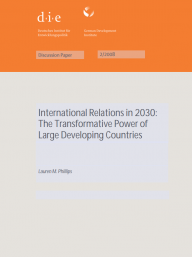
International Relations in 2030: The Transformative Power of Large Developing Countries

Abstract
This paper sets out a vision for international relations and development cooperation for the year 2030. It argues that the major transformation of the international political economy between 2007 and 2030 is likely to be the rise of large developing countries to great power status. Current trends in the growth of the economic and political power of such countries are examined, as are risks to their continued growth. These trends suggest that by 2030, it is highly likely that China, and potentially other developing countries will have become major powers, and that the international distribution of power will be multipolar. This multipolarity is less likely to be conflictual than in previous periods of historical multipolarity because of the growth of international institutions and because of the economic interdependebce of major powers. The implications of this rise of large developing countries on poorer, smaller countries are not clear cut: while smaller developing countries may benefit from an increased diversity of development paradigms and reformed international institutions, conflict amongst great powers for power and influence could be played out on their territory. However, conflict between North and South over development goals and objectives is not thought to be a major risk. The overall vision for 2030 is an optimistic one, but this optimism depends both on the actions of existing and new powers in the coming 25 years.
- Issues:
- Economics, Global and Domestic Governance
- Region:
- Global
- Year Published:
- 2008
- Author:
- Lauren M. Phillips
- Institution:
- German Development Institute (DIE)

